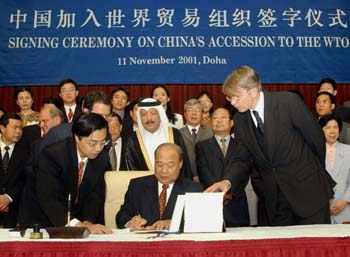| Tools: Save | Print | E-mail | Most Read |
| China Questions and Answers |
| Adjust font size: |
Q: Some countries argue that China has not fulfilled its WTO commitments. Three years after entry into the WTO, what is the situation? What kind of positive significance China's entry has on its economic development? A: There is an old saying in China: Be true in word and resolute in deed. China will strictly adhere to every commitment it has made. In the past three years, the country carried out every commitment promised to the WTO. This adherence is reflected in the following four aspects. Firstly, tariffs imposed by China have been further reduced. Statistics show that after China's entry into the WTO, the general level of tariffs decreased to 10.6 percent in 2004 from 15.6 percent in 2000, with the average tariff on industrial commodities being 9.5 percent and that on agricultural products 15.8 percent. In terms of non-tariff measures, China called off the quota licenses of 39 taxation categories. In accordance with the information technology (IT) agreement, the tariff on all IT products was reduced to zero in 2005. Secondly, the market has been further expanded. In the past few years, the total foreign volume increased to US$1,154.8 billion in 2004 from US$620.8 billion in 2001. The import volume rose by 21 percent in the first year after China entered the WTO, 40 percent in the second year and, despite a macro-control, 35.7 percent in 2004. Thirdly, foreign trade managerial authority has been completely liberalized. China committed that in the three years after entering the WTO, Chinese enterprises, foreign companies and individuals as well as sole proprietors in the WTO's member States would be allowed to engage in the import and export of all commodities in China. This commitment has been affirmed in the revised Foreign Trade Law of the People's Republic of China in 2004. Currently, an equal competition environment has initially been formed among all proprietors of foreign trade entities. Fourthly, China has been working to improve the legal system and the investment environment. Over the past three years, relevant departments of the Chinese Government have cleared more than 2,300 laws and regulations, of which more than 320 have been revised by the National People's Congress, the State Council, or relevant departments and more than 830 have been abolished, involving commodity trade, service trade, intellectual property rights, investment and others. At the same time the local governments at all levels have abolished or revised more than 190,000 local rules and regulations as well as other policies and measures in accordance with WTO trade rules and China's commitments. Additionally, China has conscientiously carried out commitments to open service trade, including finance, insurance, telecommunications and legal services. By the end of 2004, 62 foreign banks from 19 countries had established 204 representative offices or branches in China, 105 of which gained permission to handle RMB business. A total of 40 foreign insurance companies set up 70 joint ventures in China. In terms of retailing, more than 200 foreign companies had built up more than 4,000 retail centers in the country. With regard to intellectual property rights protection, China has also made an enormous effort in updating the trademark law, the patent law and the copyright law. In some aspects, the protection level has matched that of the developed countries. In 2002 and 2003, China received two transitional checks by 17 institutes organized by the WTO concerning the country's implementation of its commitments. The cooperative manner and great amounts of work done by China, especially the achievements and efforts, won praise from WTO members. Chinese entry into the WTO has had a positive impact on its economic development. In the past three years, the country's national economy continued to grow with an annual GDP growth rate of 8 percent or higher. The volume of import and export jumped to more than US$1,000 billion from US$600 billion, making China the third largest trade country in the world. As well, China's better trade environment provides an excellent environment for foreign investment. The perfection and transparency of domestic laws and regulations has greatly encouraged foreign investment in China. During the past three years, actual foreign investment reached more than US$50 billion annually, which has motivated economic development of China. The gradual opening of the service trade has brought a new appearance to such fields as finance, insurance, telecommunications, law, accounting, education, construction and tourism and increased the scope and raising the levels of the service industry. Consumers have benefited more and business operators have improved their competitiveness in the process. The service industry has provided more jobs for the people and the comprehensive national strength of China and its position in the world has further improved.
|
| Tools: Save | Print | E-mail | Most Read |
 |
| Related Stories |
|
Product Directory China Search |
Country Search Hot Buys |
